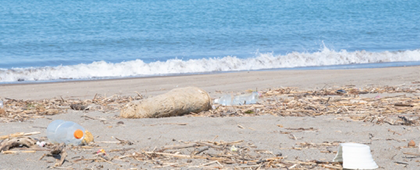Much of plastic products including plastic bottles we use in our daily lives are often going into the ocean, and this is becoming a serious problem in many parts of the world. Marine litter problem has now become one major environmental issue that must be tackled by the entire world, as well as climate change and biodiversity ones. In particular, the NOWPAP region is one of the most polluted sea areas in the world, and therefore, collaboration and cooperation among the member states and others are strongly needed to address the problem. In 2022, it was agreed at the General Assembly of the United Nations Environment Programme (UNEA) to formulate an international convention on marine plastic litter, and the development work of an international legally binding instrument on plastic pollution has been underway to be completed by the end of 2024. Once it is officially set, it is expected that many countries will accelerate their actions against marine litter.
CEARAC Activity
NOWPAP initiated activities on marine litter (MALITA) in 2006, and in 2008, the regional action plan on marine litter (RAP MALI) was agreed upon by the member states. Since then, each member state has taken various measures against marine litter to resolve the problem, such as understanding the current status, preventing its generation, and collecting and processing existing marine litter. Since addressing marine litter is a collaborative work in the NOWPAP RAP MALI, CEARAC is mainly responsible for land-based marine litter pollution and has prepared several materials including monitoring guidelines to understand the current status of marine litter, a booklet on best practices for prevention of marine litter input from land-based source, and a booklet for recycling marine litter, which are all aiming to contribute to each state’s marine litter programs and projects. CEARAC has also prepared promotional and educational materials for citizens to raise their awareness, as it is important for them to recognize that marine litter is their problem and make efforts to avoid generating litter as much as possible.
・Marine litter management within a river basin: A case study of Oyabe river basin, Toyama Prefecture, Japan (2015)
・Regional report on measures and best practices for prevention of marine litter input from land-based sources in the NOWPAP region (2013)
・Best practices for prevention of marine litter input from land-based sources in the NOWPAP region (Pamphlet) (2013)
・Marine Litter Guidelines for Tourists and Tour Operators in Marine and Coastal Areas, Revised version(2011)
・Current situation on marine litter in the NOWPAP region (Leaflet) (2010)
・Model Survey for Reduction of Marine Litter (2009)
・Marine Litter Guidelines for Tourists and Tour Operators in Marine and Coastal Areas (2007)
・What can we do about marine litter?(Leaflet)(2007)
・Recycling Plastic Marine Litter (Booklet)(2007)
・Guidelines for Monitoring Marine Litter on the Beaches and Shorelines of the Northwest Pacific Region (2007)


